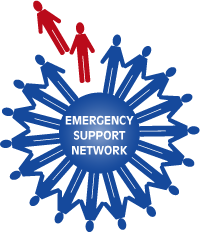Introduction
In one of the first studies of its kind with respect to peer support, the Peer Support Project (2011) engaged Delphi methodology to examine peer support programs, including their usage, efficacy and future implications. The Delphi method, increasingly used in fields of social science, acknowledges the value of expert opinions, experience and intuition when full scientific knowledge isn’t available. The project uncovered consensus on a variety of peer support topics as well as for the increased usage of the programs on the whole.
Background
The Peer Support Project sought to find international consensus of expert opinion on a series of issues and topics within peer support programs. Continuing to emerge as a standard practice in high-risk agencies such as emergency services, mental health, the military and more, peer support programs seek to offer unique support services for those who are regularly exposed to traumatic and high stress situations. With the global augmentation of peer support programs, the Peer Support Project was interested in eliciting evidence regarding the effectiveness of the programs.
While previous studies on peer support programs indicated that more evidence was needed regarding the effectiveness of these programs (traditional randomised clinical trials are difficult to implement in real-world peer services, hence the paucity of rigorous study on this topic), earlier studies have indicated that these programs can lead to increased self-esteem and confidence, better decision-making skills, improved social functioning, decrease in psychiatric symptoms and hospitalisation, lower rates of isolation, expanded social networks, greater pursuit of educational goals and more, hence the desire to further examine peer support programs.
Methodology
A total of 92 participants – both experts and practitioners in the field across a wide range of ages, locations, professions and roles – engaged in the study. Their roles included peer supporter, peer support coordinator, academic/researcher, trainer/educator, manager/administrator, policy maker and clinician. Participants represented Australia, New Zealand, Europe, United Kingdom, United States, Canada and the Middle East. Seventy-five percent of participants had more than 5–10 years experience in peer support, and nearly half had greater than 10-20 years. Further, the project involved a literature search to generate statements for consideration, from which a survey was developed. Following the development of the survey, the team used a Delphi process to seek consensus on these peer support statements.
Results
The Delphi method involves at least two rounds of surveying, and this project asked participants to rate agreements with a series of statements over three rounds. (After each round, a facilitator provided an anonymous summary to each participant.) In all, 62 of 77 statements considered over three rounds were deemed to have reached consensus. From both the statements that reached consensus and those that did not, the Peer Support Project team was able to develop key recommendations and conclusions regarding the use of peer support in high-risk environments and industries.
Key Recommendations
Eight key domains of recommendations emerged from the Peer Support Project’s findings. Chiefly, the project found international consensus on the view that all high-risk industries should have well-planned, integrated and tailored peer support programs for current employees (as well as support for former employees, for a limited time following their period of employment). Likewise, the project team encourages that the following recommendations be thoughtfully implemented based on each company or industry’s specific needs and issues in addition to the development of research trials for further examination:
- Goal of peer support: Peer supporters should offer empathy, listening, provide low-level psychological intervention, identify colleagues who are potentially at risk to themselves or others and facilitate a path to professional help.
- Selection of peer supporters: A peer supporter should be a member of the target population, have considerable experience within that field, be respected by peers and undergo an application/selection process.
- Training and accreditation: Peer supporters must be trained, meet specific training standards, and undergo ongoing training, have regular supervision, review, and accreditation. Training should involve an appropriately qualified mental health professional and include specific skills in simple psychological techniques such as listening and awareness of more advanced skills including psychological first aid, mental health first aid and crisis intervention. An understanding of support services and psychological treatment to enable the facilitation of utilizing professional supports was believed to be useful. It was perceived important that peer supporters have access to funded and appropriate professional development activities.
- Mental health professionals: All programs should have an appropriately qualified mental health professional involved in the peer support process as a clinical director who maintains involvement in both supervision and training.
- Role: Peer support programs should be part of routine employee health and wellness (not just for high-risk or emergency situations). Program protocols should include referral for more complex cases or those requiring more than three or four contacts (except in protracted situations, i.e. marital breakup) as well as standards of confidentiality.
- Access to peer supporters: Peer support should be offered immediately after high-risk incidents. Otherwise, employees should have the opportunity to self-select their peer supporter from a designated pool of candidates, on a spontaneous and informal basis.
- Looking after peer supporters: These individuals should not be on call 24 hours a day. They require easy access to mental health support, professionally or personally, if needed, in recognition of the demands of this work. Regular peer supervision needs to be part of the program.
- Program evaluation: Peer support programs should include clear goals that are linked to specific outcomes and be regularly evaluated by an external, independent evaluator. Evaluation should include qualitative and quantitative information, feedback from those using the service and objective factors such as absenteeism, sick leave and staff turnover, where possible. It was perceived that indicators of success may include increase in appropriateness of referrals for professional assistance, work performance, overall staff satisfaction and decreases in turnover, sick leave and stigma pertaining to psychological ill health.
Other Findings
During the study, participants did not agree with:
- Not having a selection process.
- Not having specific peer support training.
- Peer supporters being trained in high level mental health skills such as cognitive therapy as well as prolonged exposure.
- The need to discuss every case or contact with a mental health professional.
- Be on call 24 hours per day.
- Formal evaluation being unnecessary.
- Peer supporters providing ongoing formal intervention or advocating for peers in dispute situations.
Consensus was not reached among participants across several areas. It was indicated by participants that this was due to the nature of the peer support program being dependent upon the situation or context in which it operates. Issues that did not reach consensus included:
- Payment or non-financial compensation for peer support activities.
- Having a roster system or only operating within work hours.
- Providing a mobile telephone number to colleagues.
- Having the regular administration of measures such as checklists to monitor progress.
- The position that people will use the program if they are distressed.
- That all individuals who had experienced a high risk event should be contacted by a peer supporter to see if they are okay.
Implications
The chief implications of the Peer Support Project are that peer support programs are internationally effective. According to Delphi methodology, they require certain standards of implementation as well as additional research and study. It was indicated that programs need to be carefully integrated with other support services such as Employee Assistance Programs (EAP) where possible. Clear and explicit protocols around confidentiality, communicated to the target population, were also important. The study found that it was essential that confidentiality be maintained by peer supporters at all times, with the exception of risk, i.e. harm to self or others, and that in these cases it would be expected that contact be made with the clinical director or a peer supervisor. Organisational support and acceptance was also seen as instrumental in peer support programs.
Conclusion
The Peer Support Project revealed that it is possible to develop clear guidelines on the goals of peer support, training/supervision of peer supporters, models and delivery, and the evaluation of peer support programs that meet the standards of both experts and practitioners in peer support. These standards can guide the development of future peer support programs and additional research programs. It was found that there is growing evidence that peer support programs can bolster an individual’s ability to cope with stressful or traumatic situations and that peer supporters can provide a valuable, much-needed service and resource. As such, there needs to be more study of, and support for, peer support programs in high-risk industries as well as being part of routine organizational employee health and wellness initiatives.
(Ref: Australian Centre for Posttraumatic Mental Health (2011). Development of guidelines on peer support using the Delphi methodology. Unpublished report: ACPMH (www.acpmh.unimelb.edu.au).





